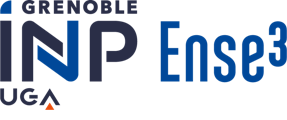Volumes horaires
- CM 26.0
- Projet -
- TD -
- Stage -
- TP 34.0
- DS -
Crédits ECTS
Crédits ECTS 5.0
Objectif(s)
Robots are rapidly evolving from physically bounded to their work-cells, to increasingly complex machines capable of performing challenging tasks. The objective of this course is to provide the basic concepts and algorithms required to develop mobile robots that can act and evolve autonomously in complex environments.
Ahmad HABLY
Contenu(s)
The course is composed of 3 main blocks: modeling and control of UAVs, estimation and data fusion with Kalman filter, and the perception for robotics and implementation on ROS. Here are the details of the different blocks:
A.Modeling (mobile and Aerial robots)
a.Basis of rigid body representation in the 3D space
b.The different types of robots and drones
c.A first basic modeling
d.Advanced elements for the case of quadrotors
e.Computer session on the modelling of drones
B.Perception for robots
a.Inertial and magnetic measurements (magneto, gyro, accelero), inertial/attitude units, barometer and encoder/odometer
b.Depth sensors (sonar, infrared, lidar, ...) and vision (optical flow, mono, stereo)
C.State estimation – localization – mapping
a.Multi-sensor fusion for inertial/magnetic navigation via static and dynamic state estimation (Least squares algorithms, gradient algorithms, observers, Kalman filter, complementary filter, etc.)
For the labs, one has:
- Lab on attitude estimation (for example) with Matlab (simulated or real data), detection of motion, detection of moving objects, tracking of moving objects
- Control for drones:
a.Trim control
b.Hovering flight
c.Trajectory generation and control: Computer session on the control of drones. - ROS:
a.Introduction to ros
b.Using ROS with a mobile robot (laser data acquisition + control of mobile robot)
c.Detection/tracking of moving objects with a laser scanner
d.Localization – mapping with a mobile robot
control, programming language, observer
Session 1
Contrôle continu (CC1): moyenne des notes de TP/BE ROS, estimation et contrôle de drone
Examen terminal (ET1) : devoir surveillé écrit de 1h
Session 2
Contrôle continu : la note (CC1) est reportée en session 2, elle n'est pas rattrapable (CC1=CC2)
Examen terminal : la note de session 2 (ET2) remplace la note de session 1 (ET1)
L'examen existe uniquement en anglais 
Le cours est programmé dans ces filières :
- Cursus ingénieur - Ingénieur ASI - Semestre 9 (ce cours est donné uniquement en anglais
 )
) - Cursus ingénieur - Master inter MARS - Semestre 9 (ce cours est donné uniquement en anglais
 )
)
Code de l'enseignement : WEUMROB0
Langue(s) d'enseignement : 
Vous pouvez retrouver ce cours dans la liste de tous les cours.



